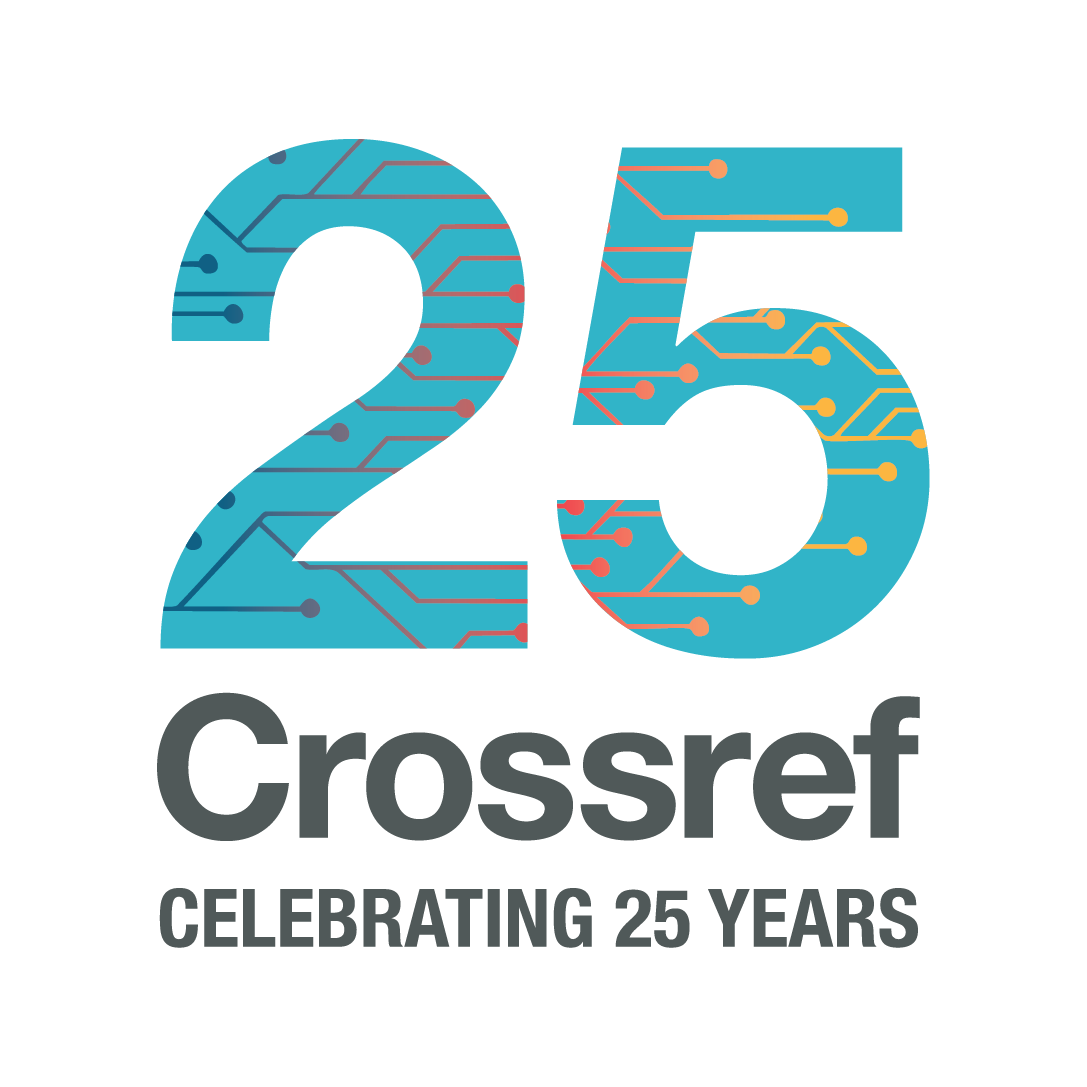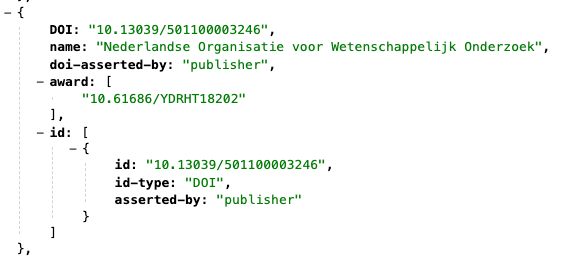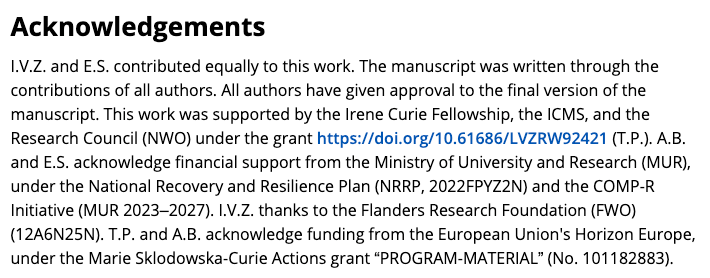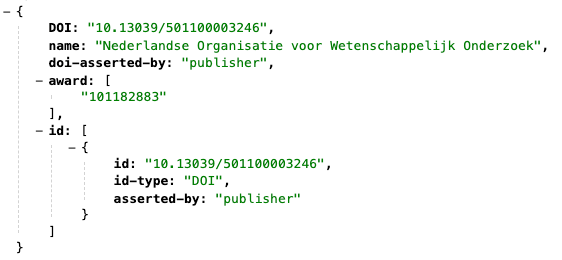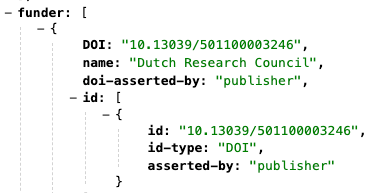8 minute read.Celebrating one year of Crossref Grant IDs at NWO
This month marks one year since the Dutch Research Council (NWO) introduced grant IDs—an important milestone in our journey toward more transparent and trackable research funding. We created over 1,600 Crossref Grant IDs with associated metadata. We are beginning to see them appear in publications. These early examples show the enormous potential Grant IDs have. They also highlight that publishers could extend their efforts to improve the quality of funding metadata of publications.
The promise of grant linking
For decades, funders have struggled with a seemingly simple challenge: tracking the research outputs that arise from their funding. The traditional approach—requiring grantees to cite their grants in acknowledgement sections of their papers—has all kinds of problems. Authors make many errors in providing this information, and even when funding organizations and schemes are cited correctly, there is no guarantee that a grant number is globally unique and not already in use by another funding council in the world.
To address these issues, and in collaboration with the research funding community, Crossref introduced the Grant Linking System (GLS) six years ago. The system allows funding organizations to assign globally unique and persistent identifiers to their grants, but - more importantly - the system allows connecting these grants with the outputs arising from them. The vision is straightforward: authors include Grant IDs (which are Crossref DOIs) in the funding acknowledgements of their research articles. Publishers either take these IDs from the acknowledgement or proactively ask authors for these IDs in their submission system. Next, when a publisher registers their publication with Crossref, it includes the grant identifier in the metadata of that publication, creating an unambiguous link between the publication and the grants from which the research was funded.
This last step—including the Grant ID in the metadata of the article when registering the publication with Crossref—is a crucial part of the system as it enables anyone to automatically retrieve all publications arising from a given grant over time via the Crossref API. Funding organizations interested in tracking the impact of their funding could then stop asking their grantees to manually report on the outputs of their funding, as most still do today. Instead, this information would become open data that funding organizations harvest directly themselves, reducing administrative burden on researchers while enhancing the ability to track the impact of their funding.
As Robert Kiley, former head of Open Research at the Wellcome Trust, which piloted the GLS in 2018, put it: “…if every funder were to adopt such a system and expose their grant metadata in a consistent, machine-readable way, it would facilitate the development of applications to help funders get a greatly enhanced picture of the global funding landscape, which in turn would inform strategic planning and resource allocation.”
NWO’s implementation journey
NWO joined Crossref’s Grant Linking System in 2024. It reflects our broader commitment to open science and aligns with our Persistent Identifier Strategy published in 2021, and our support for the Barcelona Declaration on Open Research Information. Since August 2024, all new grants awarded from July 2024 onward receive a Crossref Grant ID that persistently resolves to the information about the grant on our website, displaying all basic award information including project titles, summaries, grantee names, and affiliations. NWO is one of the 44 funding organizations worldwide that have introduced Crossref Grant IDs for their collective 111 funding programs. Other organizations include the European Commission, OSTI-DOE, the Wellcome Trust, Moore Foundation, Fonds de Recherche du Québec, CSIRO, Japan Science and Technology Agency, and the Austrian Science Fund.
Although it took time, implementation at NWO in general proceeded smoothly. Over the course of a year, we’ve registered over 1,500 grant records without experiencing difficulties or complaints from researchers. On the contrary, after we announced the introduction of Grant IDs, some researchers expressed disappointment on our decision—for practical reasons—to only register DOIs for new grants instead of the entire historical record. This shows that researchers understand the importance of persistent identifiers. Already, a year after its introduction, we are seeing the first NWO Grant IDs appearing in publications— showing that researchers are taking the extra step to look up their Crossref Grant ID and include it in their articles, as we are asking them to do.
However, publishers don’t always manage to handle these identifiers in the way we expect them to.
Linking grants to publications in real life
One of the first publications to include an NWO Grant ID is a paper by Weile et al., published by the American Physical Society (APS) in the journal Physical Review X. On the left, we see the funding information provided by the authors, as included in the acknowledgement section of the published article. Funding by NWO from its Talent Scheme VIDI is identified with a Grant ID https://doi-org.ezproxy.csu.edu.au/10.61686/YDRHT18202.
On the right, we see how APS has included this information in the metadata of the publication: NWO is identified with its Funder ID and the grant with the Grant ID - forging an unambiguous link between funding and publication, initially between this particular grant and this particular publication, but potentially in the future between this grant and all other outputs arising from it. This works so long as all publishers include this information in the metadata of their publications; we need to encourage more publishers and other Crossref members (e.g., preprint services, repositories, blog platforms) to follow the APS example and do the same.
Where publishers fall short
There are big differences among publishers in their ability to include funding metadata. Many have been including funder IDs in the metadata for more than a decade, but some are still struggling to do that. Most are yet to catch up to start including Crossref Grant IDs, too.
Let’s demonstrate that in an example. On the left, we see the acknowledgements section of a paper by Van Zundert et al. in the journal Small, published by Wiley. The authors acknowledge a host of funding organizations and grants, including NWO with Grant ID https://doi-org.ezproxy.csu.edu.au/10.61686/LVZRW92421. On the right, we see that the publisher has correctly included NWO in the metadata as the funder with our Funder ID, but there’s no reference to our Grant ID, instead mentioning an award number, which seems to refer to a Marie Sklodowska-Curie grant for the same research with their internal award identifier.
Likewise, a publication by Criscuolo et al in Physics of Life Reviews (a journal published by Elsevier) correctly identified NWO using our Funder ID, but omitted our Grant ID in the metadata, despite its clear inclusion by the author in the acknowledgements (left). Apparently, this persistent link and open metadata is being thrown out of the infrastructure at a crucial time, when the article record could be connecting up with the grant record and making it easy and open for us all to track and report on the connection.
Several publishers do not seem to register funding data at all, despite the opportunity existing for almost 15 years, and sometimes even when comprehensive funding information is provided by authors.
The broader implications
It has been known for some time that publishers struggle with registering complete, high-quality funding metadata for their publications. They sometimes blame authors for not providing the required information or making errors in reporting their funding. Or they call on funders to identify their funding more precisely by introducing persistent Grant IDs for their grants. While these are legitimate issues, and it’s true that more funders could also do this, the examples presented here suggest this narrative is incomplete—when authors provide clear, standardized funding information using persistent identifiers, many publishers still fail to capture it accurately.
The Grant Linking System is still relatively new in terms of open infrastructure and open metadata development, and adoption from funders is still in the tens rather than the tens of thousands, with publishers being more accustomed to creating and providing millions of open metadata records for their publications. Most participating funders, like us, have only started registering grants in the past couple of years. Now that Crossref Grant IDs are becoming more widespread, and with publishers’ experience in creating open metadata, we would love to see publishers prioritise collecting and including Grant IDs in their Crossref metadata. By updating their production practices, they would be supporting the community at large in reaping the benefits of open grant metadata.
To address these challenges, we are organizing a roundtable session under the Barcelona Declaration in October to discuss concrete solutions for these issues. We invite publishers who are interested in participating to contact us. This follows a 2023 workshop where many publishers were very open in discussing the challenges and working towards improving the process together with funders.
Looking ahead
The introduction of Crossref Grant IDs represents just the first step in a longer journey toward more open research information for NWO. We are happy to see how quickly researchers are adopting the system by including Crossref Grant IDs in their work. For Grant IDs to truly become a Grant Linking System and fulfil its promise, however, publishers must act on the need to collect and process funding information in their publishing workflows, just as they do for other joint efforts, such as for ORCID iDs for contributors. The information is there—authors are providing it in the acknowledgement sections of their articles (and probably would too if asked directly in a submission form). The question now is: can we encourage more publishers to take up the request to capture and transmit this information accurately and register it with Crossref?
We’re hopeful. This first year has demonstrated the enormous potential of Crossref Grant IDs in action for NWO. We call on publishers to do their bit in ensuring this vital infrastructure reaches its full potential for the research community.
Further reading
- Oct 15, 2025 – Integrating grant metadata for seamless research interconnectivity at FCCN|FCT
- Oct 1, 2025 – Piecing together the Research Nexus: uncovering relationships with open funding metadata
- Jul 23, 2025 – Connecting the dots: FWFs transition to linked grant metadata to support a thriving culture of openness
- Nov 17, 2022 – How funding agencies can meet OSTP (and Open Science) guidance using existing open infrastructure
- Dec 13, 2017 – Global Persistent Identifiers for grants, awards, and facilities
- Nov 5, 2025 – Announcing changes to REST API rate limits
- Nov 4, 2025 – Celebrating Noyam Journals’ Metadata Award
- Sep 22, 2025 – Crossref and PKP enter new partnership phase to support richer and more inclusive metadata





